Holzer Permaculture for future reference
By now, there are a number of publications on Holzer’s Permaculture available. Many of the books have been translated into other languages. You can buy these publications directly at a bookstore or on the internet.
DVD
 Holzer’s Permaculture Now! – Desert or Paradise?
Holzer’s Permaculture Now! – Desert or Paradise?
Starring: Sepp Holzer, Director: Leila Dregger Ludwig Schramm, Translation: 11 languages
from $24.95
BOOKS
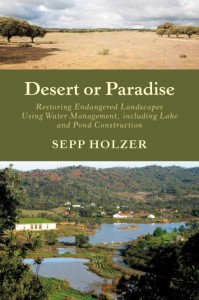 Desert or paradise. Holzer’s Permaculture now!
Desert or paradise. Holzer’s Permaculture now!
From the restoration of endangered landscapes over aqua-culture and habitat structure to urban gardening
Sepp Holzer, Leila Dregger
Leopold Stocker publishing
First Edition: 2011
Languages: GERMAN AND ENGLISH
Permacultural pioneer and “agricultural rebel” Sepp Holzer presents a new book: In “Desert or Paradise” he is dedicated to the hot topic of increasing environmental disasters caused by mistakes made in agriculture and forestry. The practical section shows solutions.
Sepp Holzer has shown revolutionary new ways for local agriculture by applying common sense methods: observe nature, draw conclusions and act accordingly. Meanwhile, the “agrarian rebel” has become an internationally renowned expert and helps from Russia via Scotland, Spain and Portugal and as far away as South America to restore the landscapes and development of alternative possibilities of self-supply in urban areas.
The main focus of Sepp Holzer’s new book is, creating ponds and lakes and nature appropriate water management as a foundation of any restoration of landscapes. Reforestation, mixed cultures and regeneration of soil life are other key issues in Sepp Holzer’s strategy for global food security. Self-sufficiency is – with the right methods – available everywhere on earth. Thoughts on animal husbandry, which sees the animals as an employee, not as a commodity, complete the book.
The practical part deals with the system of ponds and lakes, with an introduction to permaculture for home gardens including creative ideas for “Urban Gardening” in a confined space, such as balcony gardens, hanging and vertical gardens etc. How can farmers implement the principles of Holzer’s permaculture? Covering all the following as well: regeneration of polluted land, the regulation of pests, right irrigation methods, frost protection and habitat-friendly farming. Seed production, new ways of beekeeping and the rescue of the withering away of threatened trees are other areas of the practical part.
With the collaboration of journalist Leila Dregger, Sepp Holzer shows new ways of earth healing that can help prevent natural disasters in the future.
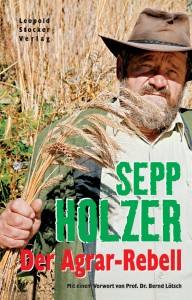 Sepp Holzer – Der Agrar-Rebell und seine neuen Projekte in aller Welt
Sepp Holzer – Der Agrar-Rebell und seine neuen Projekte in aller Welt
[Sepp Holzer – The agrarian rebel and his new projects around the world]
Peter Steffen
Leopold Stocker publishing
First Edition: 2007
Languages: GERMAN only
With the new book about the “agrarian rebel” Sepp Holzer there is now a great-screen text book that documents his new projects at home and abroad. In beautiful photographs an insight into the colorful life at the domestic Krameterhof is given.
The author, freelance journalist Peter Steffen, who has Sepp Holzer monitored for years on his travels around the world and over time was able to witness the progress of various Holzer projects, captured in expressive images not only the unique work Sepp Holzer does, but also his charismatic personality.
The book makes clear: Sepp Holzer has a respectful relationship with nature; he feels obliged to preserve and protect all of creation. “The agricultural rebel” is making every effort to give people the sense of the uniqueness of nature. This concern of his characterizes his projects in Austria, Spain, Russia, Scotland, Chile, Jordan and elsewhere. Often enough Holzer is in demand as a “crisis firefighter”; he shall correct the damage human folly has done in nature. It is this nonsense, that Holzer points out repeatedly using simple straight honest words; his openness sometimes brings him criticism, but even more enthusiastic encouragement of those, who feel that a foundational change is necessary in our relationship with nature.
“Holzer’s Permaculture” does not see itself as a science, and it is not a patented research method or textbook strategy. It is, as Sepp Holzer is not getting tired of explaining, lived understanding of nature by intertwining nature’s wisdom, the respect for animals and respect for creation. In Peter Steffens book this approach is reflected not only in sensitive lyrics, but also in corresponding images that kaleidoscopically capture the Holzer-world of permaculture.
 Wo ein Wille, da ein Weg
Wo ein Wille, da ein Weg
[Where there’s a will, there’s a way]
Naturopathic knowledge, experiences and practical use of herbs as practiced by the agrarian rebel
Sepp Holzer, Claudia Holzer, Josef A. Holzer
Kneipp-Verlag GmbH
First Edition: 2006
Language: GERMAN only
Hardcover with CD Paperback (no CD)
Sepp Holzer’s firm belief is that in any environment you can fall back on a diet provided by nature and ancient knowledge of herbs. He tells his experience of herbal medicine and with conventional medicine, which did not help him, his return to nature and to the herbs and he gives instructions on herbal cultivation using Permaculture (Herbs build in structures of mountains, winding mounts, walls etc.). Furthermore Holzer presents his Permaculture projects in Scotland and Spain.
In the accompanying audio CD Sepp Holzer talks about Holzer’s Permaculture, naturopathy, positive and negative energy for animals and humans, his desires for the future as well as two anecdotes from the world of a farmer.
The book with hardcover is currently not available. However, it is an issue in paperback (without CD) available
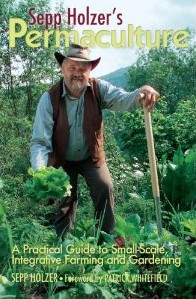 Sepp Holzer’s Permaculture
Sepp Holzer’s Permaculture
Practical application for the Garden, Fruits & Agriculture
Sepp Holzer Holzer, Claudia Holzer, Josef A. Holzer
Leopold Stocker publishing
First Edition: 2004
Languages: GERMAN, ENGLISH, FRENCH
In this practical book, Sepp Holzer explains the principles of his permaculture and shows how they can be handy even already implemented in the small garden in the balcony garden. He also makes it clear in many examples, as well as the acquisition even agriculture can be designed according to these principles and what alternatives there are.
• Creation of micro-climate zones by sun traps, wind brake and, ways of steering and storage of water, pseudo-problem dryness.
• improving soil health, importance of plant communities, mixed cultures.
• application of permaculture in small and city gardens, patio and balcony gardens and cottage garden.
• Naturbelassener fruit growing in large and small scale, fruit growing in alpine regions and on difficult surfaces, artistic design (Mehrstämmigkeit and Zwiesel trees). Finishing techniques, old varieties for special purposes (fires, juices, vinegar …)
• Mushroom cultivation on straw and wood, forest mushroom cultivation
• Alpine plants in lowland
• Fertilization, regulation of problem plants and face drought in Crop Production. Old varieties, alternative products such as herbs, flowers, alpine plants, seed production, among others
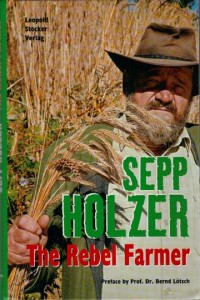 The Rebel Farmer
The Rebel Farmer
Sepp Holzer, Konrad Liebchen
Leopold Stocker publishing
First Edition: 2002
Languages: GERMAN, ENGLISH
GERMAN cover ENGLISH cover
The book Sepp Holzer – The Rebel Farmer describes the life and work of Sepp Holzer, who is now in many respects everyone’s lips. He draws on a mountain farm in 1,500 meters above sea level kiwis, cherries and pumpkins in the middle of winter, he harvests radishes, and his corn growing in the forest: The “Krameterhof” has become a symbol of a new way of farming. Hundreds of buses bring interested visitors each year to visit, and the media – the Austrian television to the “Spiegel” – a detailed report.
Sepp Holzer has its own form of permaculture developed, which is the subject of scientific research already and was also project the EXPO 2000 in Hannover. Under skilful use of ecological relationships and cycles of nature he can work for himself and achieved with minimal effort – and without harming the environment – maximum economic success.
In this book, Sepp Holzer not only explains the basic principles of his thought and the essential knowledge, who supplied him with his gift for exact observation of nature, he also portrays alive his endless battle with authorities that it did everything to stop the testing of alternative farming methods. Photos from “Krameterhof” show insight into the unique world of agriculture.
DVDs (videos) & CDs (sound)
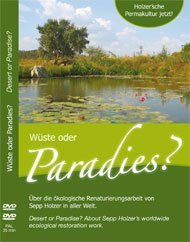 DVD – Holzer’s Permaculture Now! – Desert or Paradise?
DVD – Holzer’s Permaculture Now! – Desert or Paradise?
Sepp Holzer, Leila Dregger Ludwig Schramm
Year of publication
11 Languages: German, English, Spanish, Portuguese, French, Russian, Greek, Norwegian Subtitles in Arabic, Chinese (traditional and simplified) and Swahili
Desert or Paradise? About Sepp Holzer’s worldwide ecological restoration work. Sepp Holzer, the “Rebel Farmer” and ecological visionary from the Austrian Alps, studied nature from his childhood on. After taking over the Krameterhof from his parents at the age of 19, he transformed the poor mountain farm into a lush natural paradise with the cultivation of diverse wild species. For years he has supported land owners, farmers, professors and settlements in Russia, the USA, Southern Europe and other regions in the restoration (renaturation) of their land using “Holzer’s Permaculture” and by creating “edible landscapes”. This video focuses on his work with water and the creation of water landscapes, lakes, and ponds. Sepp Holzer: “Once water is in balance, 70% of the work is done, as the surface of the earth as well as we humans are 70% water.
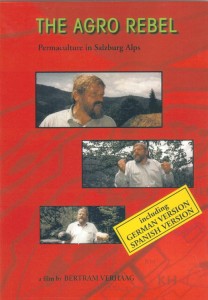 DVD – The agricultural Rebel
DVD – The agricultural Rebel
Permaculture in the Salzburg Alps
Bertram Verhaag
Year of publication 2001
Language: German, English and Spanish synchronized
In the southernmost part of the Salzburger Land – in the Lungau – the “Siberia Austria” the farmer and forester Sepp Holzer operates on his mountain farm an agricultural farm of a different kind.
Despite an annual average temperature of 4,5C and an altitude between 900m and 1400m and in contrary to conventional rules, he created an edible paradise landscape, and thus caused a stir. After 40 years he has succeeded in convincing his opponents of his natural farming system of using “polyculture – because all plants and animals have a useful function,” said Holzer. His way of reading nature, experimentation and inexhaustible resistance and perseverance toward authorities has paid off. Any use of pesticides, herbicides or fertilizers is omitted entirely. “Cooperate with nature instead of fighting it. Observing and read nature, and find out which plants support each other.” These are key concepts for Sepp Holzer’s principles of permaculture.
Since 1961, when he took over his father’s farm at age 19, Sepp Holzer and his wife Vroni, operate a perfectly functioning permaculture system without ever having heard of the term “permaculture”.
Laid out in terraces, similar to the rice fields in Asia, his 46 hectare of property differs strongly from the surrounding spruce monocultures: Here are growing many plants that hardly anyone would suspect at an altitude of 1400m: from cherries, apples, mushrooms and kiwis to lemons, pumpkins, potatoes and Zuchinies. Sprouting and thriving is happening here everywhere. Along the paths, terraces, in the woods, on extremely steep slopes and even on stony ground is abundance. Within the mixed culture there are about 45 water gardens, wetlands, ponds and three mountain lakes. Here, the organic farmer breeds rare fish, toads, crayfish and aquatic plants. His pigs plow the earth, harrow and fertilize, and plants supply each other with moisture, nitrogen and green manure. Sepp Holzer has less work and more time to advise interested visitors from all over the world about his mixed poly-cultures.
DVD – Sepp Holzer’s Permaculture – CURRENTLY UNAVAILABLE
3 movies on 1 DVD
Alpine Permaculture at the Krameterhof
Aquaculture
Terraces and Raised Beds
Year of publication 2005
Languages: German, English, French, Spanish, Italian, Hungarian, Polish and Russian synchronized
Alpine Permacutlutre at the Krameterhof
Permaculture in alpine regions – an insight into the possibilities of natural farming
Aquaculture
Water landscapes in harmony with nature – Sepp Holzer’s pond landscapes as an example of a natural interaction with water
Terraces and Raised Beds
Landscaping in harmony with nature – restoration measures for a functioning permaculture
The National Institute for Education and Vocational Training Mecklenburg-Vorpommern writes about this film: “The film shows an illustrative example of a specific ecosystem and its sustainable use, and is suitability for use in the classroom.”
“The film shows very clearly an example of sustainable agriculture. It can be used for the education in high school in biology, and specifically can be used to illustrate a sustainable agriculture.”
The magazine “The North Star” writes about this film. “Perma(nently)(Agri)culture, short Permaculture, this term was already coined in 1974 by the two Australians Bill Mollison and David Holmgren in their 1974 published book of the same name. In short terms the name Permaculture stands for circular economy, it work in harmony with nature nit against it. That this can be successfully achieved -. without poison, without genetic modification without the stranglehold of chemical companies and without billions in subsidies from Brussels -. shows this video impressively by featuring the couple Holzer from Austria. Sepp and Veronika Holzer are accompanied on the Krameterhof in the Lungau at 1500 m altitude during the changing seasons. The Holzers, who farm their 45 Hektarhof for 30 years as a couple, have accomplished what many dream of, an autonomous farm, fully in harmony with the nature, and even still economical. The video provokes the questioning of conventional agriculture and shows the viewer that it is possible to do business in complete harmony with nature and life. “(Magazine “The North Star”, July / August 2002).
This film (Aquaculture) was selected as a film in competition at PRIX Leonardo in Parma, Italy 2003
CD – Lemons from the Alps
Ernst Weber
Year of publication 2002
Language: GERMAN only
The natural history of the rebellion of Sepp Holzer
Recording of the radio broadcast sound pictures as an audio CD
Broadcasted on April 13, 2002 and 24 May 2003 Clock at the Austrian Sender Ö1.
Sepp Holzer, who farms in the Salzburger region of the Lungau, at 1,500 meters above sea level, its Krameterhof according to the rules of permaculture and brings it to paths that thrive there fruit trees, vegetables of all kinds, exotics such as lemons, kiwi and orchids against any doctrine well, is the focus of features of Ernst Weber. The author paints a colorful picture of this “Crocodile Dundee of the Alps”, which first attacked by the Forestry Authority, by now has become a world-leading expert in this field.
General up-to-date info about Sepp Holzer
Sepp Holzer took over his parent’s Krameterhof in 1962. From then on he expermintierte much focused on different operating branches of the business and emphasized different areas. His often unconventional views and procedures earned him the reputation of the rebel farmer. Since his son Josef Andreas took over the farm in 2009, Sepp Holzer works as a consultant and lecturer at home and abroad. The focus of his current work is large scale restoration and the construction of large-scale “Permaculture – Waterscapes”.
His philosophy and experience, he is transmitting via lectures and seminars to interested parties around the world. He also managed recently to start a “new permaculture farm” in the southern Burgenland, where he among other things conducs experiments with heat-loving plants.
More about Sepp Holzer, please visit his website www.seppholzer.at and research his numerous publications.

